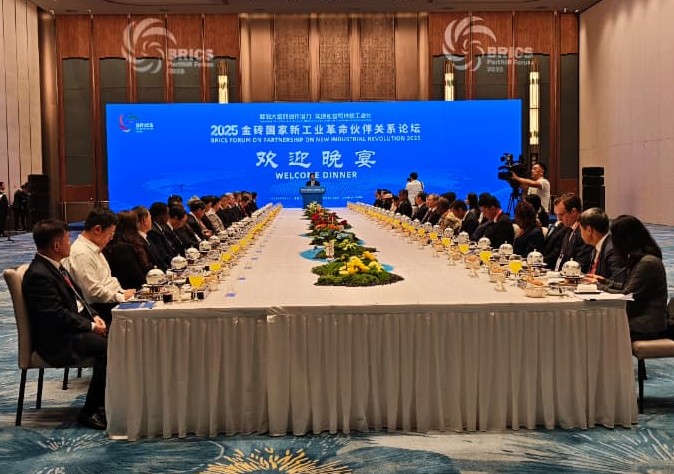Deputy Minister of Industry Faisol Riza represented the Indonesian government at the BRICS PartNIR Opening Ceremony in Xiamen, China, on 16 September 2025. The event was part of the BRICS Forum on Partnership on New Industrial Revolution (PartNIR) 2025, themed “Unlocking the Potential of BRICS Cooperation for Inclusive and Sustainable Industrialization.”
Indonesia’s participation reflects its commitment to strengthening international cooperation in promoting inclusive, sustainable, and innovation-based industrialization. The forum also presents opportunities for investment, technology collaboration, and broader global market access for Indonesian-manufactured products.
Faisol expressed appreciation to the Government of the People’s Republic of China and its Ministry of Industry and Information Technology (MIIT) for organizing the forum. He said the theme was highly relevant to Indonesia’s industrial development goals.
“Amid global transformation driven by digitalization, green transition, and shifting international value chains, BRICS PartNIR arrives at the right moment and is increasingly important,” he said in an official statement received in Jakarta on Thursday, 18 September.
Manufacturing Sector Remains a National Economic Pillar
Faisol stated that Indonesia’s involvement in BRICS PartNIR carries strategic significance, especially given its Making Indonesia 4.0 roadmap, which aims to strengthen industrial competitiveness, accelerate digital adoption, and develop an innovation-driven economy.
He referred to the Rio de Janeiro Declaration, which highlighted the importance of Global South cooperation for a more inclusive and sustainable global governance system.
“Industrialization must align with inclusivity, fairness, and sustainability, while ensuring that developing countries have a voice in shaping the future of global industry and supply chains,” he said.
Faisol highlighted that the manufacturing sector remains a backbone of Indonesia’s economy. In the second quarter of 2025, the non-oil and gas manufacturing sector grew by 5.60% year-on-year, surpassing the national economic growth rate of 5.12%. The sector contributed 16.92% to national GDP, continuing to play a key role in economic development.
Indonesia's Four-Pillar Industrial Strategy
The Deputy Minister also outlined Indonesia’s direction through the New National Industrial Strategy (SBIN), based on four core pillars.
The first pillar is the acceleration of downstream processing of natural resources—especially nickel, copper, and bauxite—to produce high-value products that boost export competitiveness and attract investment.
The second pillar focuses on developing the green industry, in line with Indonesia’s net-zero emission target for 2060. This includes transitioning to clean energy, adopting circular economy practices, and building low-carbon industrial zones.
The third pillar involves industrial digitalization through Making Indonesia 4.0, by adopting Industry 4.0 technologies to enhance innovation, productivity, and competitiveness.
The fourth pillar is the development of competency-based industrial human resources. The government continues to invest in vocational education and digital learning platforms to produce skilled and adaptable workers for the industrial sector.
“With these four strategic pillars, Indonesia is committed to building smart manufacturing and expanding the adoption of digital technologies such as artificial intelligence, Internet of Things, and cloud computing. For us, smart manufacturing is not just about efficiency, but also a path to resilience, sustainability, and inclusivity,” said Faisol.
Collaboration to Strengthen Key Industrial Sectors
Tri Supondy, Director General of Industrial Resilience, Zoning, and International Industrial Access (KPAII), stated that Indonesia is working to build a resilient digital industrial ecosystem, develop advanced materials research, and utilize new and renewable energy. These initiatives aim to create a future-ready industry capable of generating high-value jobs, reducing carbon emissions, and improving energy security.
“Collaboration with BRICS countries will accelerate research, innovation, and knowledge-sharing in support of global industrial transformation toward a green and inclusive economy,” he said.
Tri also addressed the importance of the pharmaceutical and medical device sectors, calling them critical to public well-being and industrial innovation.
“Over the past decade, Indonesia’s pharmaceutical industry has grown rapidly compared to many ASEAN countries, particularly in chemical-based formulations. However, we still face major challenges, including reliance on imported active pharmaceutical ingredients and limited production capacity for biologic drugs. That’s why collaboration with BRICS partners is essential to strengthen our domestic capacity in this sector,” he explained.
Tri reaffirmed Indonesia’s readiness to actively participate in the BRICS partnership.
“Together with BRICS partners, we have the knowledge, resources, and capacity to shape an industrial future that is greener, more inclusive, and innovation-based. Indonesia is ready to play an active role in advancing the BRICS partnership in the New Industrial Revolution, for progress that benefits all,” he said.
PHOTO:
This article was created with AI assistance.
Read More






 Monday, 02-02-26
Monday, 02-02-26







